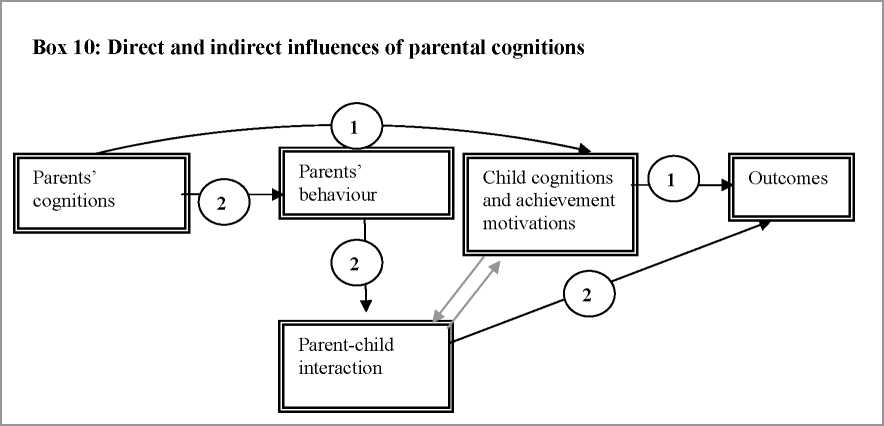Characteristics of the family
proximal family processes to influence child development in a number of ways. Box
10 below shows some of the possible pathways of influence.

First, parental cognitions matter in that they influence the beliefs, attitudes and
aspirations etc. of children directly (arrow 1). Parental perceptions of their
adolescents’ abilities are significant predictors of adolescents’ estimates of their own
ability and interest in maths, English and sports, even when conditioning on the
child’s actual performance (Alexander & Entwisle, 1988; Eccles et al., 1993; Jacobs
& Eccles, 1992; Miller et al., 1991; Pallas et al., 1994).
Secondly, parents may influence the activity choices of their children through the
experiences they provide and the behaviours they display during parent-child
interaction (arrows 2). By providing the specific toys, home environment and cultural
and recreational activities for children, parents structure their children’s experiences
and model what children see outside the home (D'Amico et al., 1983). Such parental
valuation and interpretation of reality may thus be communicated in both subtle and
more overt ways.
For simplicity, this representation of parental influence holds constant the bi-
directional influence between child cognitions and parent-child interaction (arrows in
grey). While we recognise the importance of such feedback loops, these specific
relationships are not central to our focus on the role of parents’ cognitions in
influencing child outcomes.
4.2.1 Perspectives of parental cognitions
Current work on the influence of parental cognitions on children’s development is
grounded in theoretical perspectives of motivation more generally. For example,
‘attribution theory’ (Graham, 1991; Heider, 1958; Weiner, 1985) emphasises how
interpretations of achievement, rather than motivational dispositions or actual
outcomes, determine subsequent achievement in both positive and negative ways.
Bandura’s (1994) social-cognitive model, ‘self-efficacy theory’, emphasises human
52
More intriguing information
1. THE CHANGING RELATIONSHIP BETWEEN FEDERAL, STATE AND LOCAL GOVERNMENTS2. The name is absent
3. The name is absent
4. The name is absent
5. Demand Potential for Goat Meat in Southern States: Empirical Evidence from a Multi-State Goat Meat Consumer Survey
6. The name is absent
7. The name is absent
8. ISO 9000 -- A MARKETING TOOL FOR U.S. AGRIBUSINESS
9. The Folklore of Sorting Algorithms
10. Gianluigi Zenti, President, Academia Barilla SpA - The Changing Consumer: Demanding but Predictable